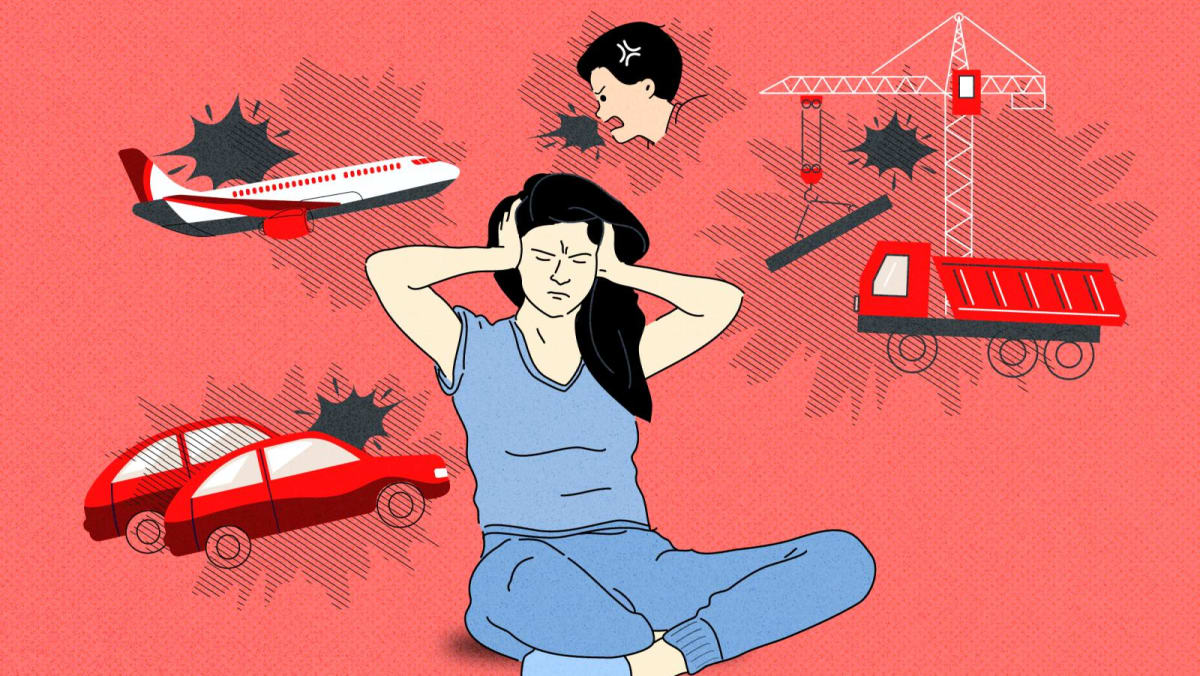It happened more than a decade ago, but I still shudder when I think about the neighbour from hell that my family had to put up with for two years.
The couple, who lived in the flat above ours, argued day and night and were constantly shouting like a group of rowdy children. Their arguments were punctuated with the sounds of banging pots and pans coming from their unit.
I was constantly on edge, and soon, every sound seemed like a racket to me. When their dog’s chain leash was dragged against the floor, I felt like I was being subjected to the screeching sound of nails against a chalkboard.
I became hypersensitive to the sound of traffic from the busy street below my house, children running around at the nearby playground and my elderly neighbour, who was possibly a little hard of hearing and used to watch Taiwanese dramas at full volume.
It was hard for my 13-year-old self to focus on homework, and even the faintest purr or hum in my neighbourhood felt like someone was stabbing my ear.
I wasn’t the only person it was affecting – every member of my family became irritable and we all argued more often as our mood soured over the inescapable noise.
While the authorities were called, the onslaught of noise only ended when our neighbours moved out.
Rediscovering peace at home felt like a weight had been lifted off my shoulders but I know of friends who have not been able to solve their noise woes.
For instance, one friend lives next to the MRT tracks along the East-West Line. While there are sound barriers, the rumbling sound of a train chugging along the tracks can never be fully eliminated.
Her solution? Head to the office or a nearby cafe to concentrate on work or use noise-cancelling earphones for most of her day.
“I feel like I’m more irritated when I hear (any) loud noise… I react much worse than my friends when I hear a child screaming or someone just being a bit noisier,” she said, adding that she spends hundreds on staycations yearly just to get some “peace and quiet”.
Why do loud noises make us want to pull our ears off and cause us so much stress?
LOUD NOISES EQUAL DANGER
Psychologists and an audiologist told CNA TODAY that our minds instinctively associate loud noises with danger.
Ms Charis Koh, an audiologist at Dr Lynne Lim Ear Nose Throat & Hearing Centre, said that when people repeatedly hear loud noises, especially those commonly associated with danger like shouting, they become hypervigilant and their bodies will never be fully at ease.
“Our auditory system is to protect us from dangers… Our body can be under stress when exposed to noise pollution,” she said.
Exposure to such noises over a short period of time might affect our ability to hear others.
“In the short term, to try to get away from the stress stemming from the noise, we develop a stress response to ignore the noise. When we ignore sounds, it makes us less sensitive to speech as well,” said consultant clinical psychologist Dr Roy Chan, the founder of psychology clinic Cloak and Mirrors.
“This affects our ability to understand others, read, remember information and communicate. It is like trying to listen to a radio with a lot of static.”
The effects worsen over a longer period of time, even if the exposure is to sounds that might not seem “too loud”.
Studies have also shown that “noise annoyance” – typically around 50 to 70 decibels and similar to the rumbling of a washing machine or loud snoring – also impacts our mental health.
“Repeated noise annoyance may increase the risk of higher stress-hormone exposures, which could be associated with a variety of mental health disorders, such as depression, anxiety (and) behavioural and learning issues in children,” said Ms Eunice Seah, a clinical psychologist with her own private practice at InPsyche Journeys Psychological Growth & Discovery.
Ms Koh also mentioned the issue of “listener fatigue”, when an individual feels tired or uncomfortable from being exposed to a sound for a long time and this impacts their mental health.
Prolonged exposure to loud noises, Ms Koh warned, might reduce people’s “dynamic range”. This means they have a distorted perception of sound and might be unable to tolerate moderately loud and uncomfortable noises.
Such prolonged exposure also has a negative effect on the physical well-being of individuals, including a higher risk of diabetes and cardiovascular issues, said experts, which in turn can add another stressor to one’s mental health.
Beyond those health ailments, those who eventually lose their hearing when exposed to loud noise for prolonged periods of time would naturally be affected mentally at the loss of one of their five senses.
And unfortunately, these individuals might then also add to the noise pollution, said Ms Koh.
For example, a person with hearing loss might not be able to hear the television, so they might increase the volume to dangerous levels, in turn disturbing other household members or neighbours.
HOW LOUD IS TOO LOUD?
There are several guidelines for noise in Singapore. The National Environment Agency for example limits the noise emitted from construction sites near residential buildings to about 75 decibels across 12 hours and 90 decibels over any five-minute period between 7am and 7pm from Mondays to Saturdays.
A 2017 National University of Singapore study found that the average outdoor sound level measured throughout the day was 69.4 decibels.
Ms Koh said that anything above 80 decibels, which is around the volume of a vacuum cleaner, can cause hearing loss.
“Most countries have workplace safety regulations that state you can be exposed to noise at 80 decibels for a maximum of eight hours a day,” she said, adding that for every three-decibel increase in noise, the time someone can be exposed to it is halved.
According to the 2011 Workplace Safety and Health (Noise) Regulations here, the permissible exposure to noise at 85 decibels is 16 hours in the workplace.
WHAT CAN YOU DO BEYOND ASKING PEOPLE TO KEEP QUIET?
Walking away from the noise would seem like the easiest solution, but it might not be possible if the source of noise is fixed, like an MRT train track outside your home.
That does not mean there aren’t ways to mitigate the stress noise can bring.
Wearing ear plugs or noise-cancelling earphones can help minimise the noise disturbance, though Ms Koh noted that noise-cancelling earphones do not actually protect our ears from the dangers of prolonged noise exposure.
People exposed to prolonged loud noises in the workplace, such as construction sites, should also seek professional help and get customised ear plugs that fit them well and wear ear muffs, she said.
The audiologist added that those with hearing loss should seek help from a professional to avoid becoming a source of noise pollution themselves.
Some people, like those with tinnitus, might find noise machines that produce white noise helpful in masking out distracting sounds like traffic.
However, Ms Koh said that such machines have varied success rates as some might become more stressed by the white noise.
For those dealing with noise at home, Ms Seah said if it is possible, individuals should use rooms further away from the source if they intend to sleep, study or work.
Beyond asking people to limit the noise they make, she said that individuals could also seek help from the authorities if those causing the ruckus are not cooperative.
Dr Chan suggested: “We can change our environment by installing double-pane windows, or acoustic wall panels if we know that there will be long-term noise, such as construction outside our window.
“While it might cost a bit more, the mental health benefits are worth it.”













